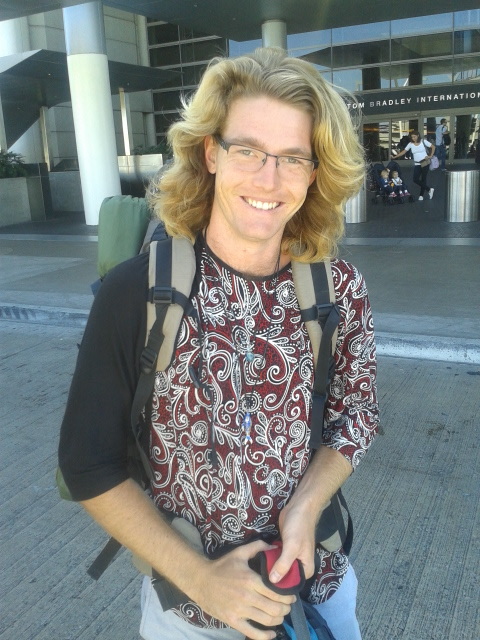|
I'm writing this travel log a bit behind schedule. Last Sunday, I hitch hiked from Prague to Germany. Hitch hiking is when you stand by the side of the road in a safe area (gas stations are also good places), and ask people if they can give you a ride. It was my first time hitch hiking, and it was an interesting experience. Lots of people in Europe and America used to hitch hike, but today, it is far less common. Many Europeans today are worried about immigration, and they are less likely to trust strangers. Still, there are many generous people around, and I made some new friends.
I eventually ended up camping in a forest outside of the German city of Dachau with three French students. We had many interesting conversations about life in Europe and America, and we talked about everything from religion to politics. During the day, we visited the concentration camp memorial site in Dachau. During World War II, Germany was led by a very powerful man named Hitler. Hitler was able to unite people all over the country, and he made them believe that they could rule the world. One of the ways that he united people, however, was by finding groups of people to hate. Hitler blamed many of Germany's problems on Jews, as well as homosexuals, communists, and others. During the war, German soldiers hunted down millions of innocent people and put them in concentration camps such as Dachau. At Dachau, tens of thousands of people were forced to spend all day working, in sun and in snow. Those who could not work were killed. Over the course of the war, huge numbers also caught terrible diseases, while others suffered as experimental subjects for German scientists. The guards at Dachau often went out of their way to make sure that life was miserable for the prisoners. By the end, over 40,000 people died at Dachau. People have found many ways to remember the things that happened at Dachau. Some have created art that expresses parts of their experience in the camp. The memorial site has a very impressive sculpture by the artist Nandor Gild that caught my eye. It is a very powerful work, and it fit the site well. At the base, there is a simple message: Never Again.
0 Comments
I've been traveling in the Czech Republic for the last two weeks. This country is filled with forests, castles, cathedrals, rivers, and a very interesting culture. Prague, the capital, sits along the Rive Vltava. There are many legends about this place, some old, and some new. Next time I might write about some of the legends surrounding Prague. This time, I want to tell you about a real-life hero that walked the streets of Prague more than 70 years ago. His name was Sir Nicholas Winston.
Sir Nicholas Winston was a British clerk who came to Prague in 1938 to help his friend, who worked with Jewish refugees. Refugees are people running away from a disaster. The disaster that thousands of Czech and German Jews were running from was Nazi Germany. Nazis believed that they were better than all other people, and that some people, like Jews, should be killed. They did many terrible things, and started the Second World War. Sir Nicholas Winston knew that the Nazis would come to Prague soon, and he started trying to help save Jewish children in the city. He set up an office where parents could come in with their stories. Then, he organized families in Britain, making sure that the children he saved would have a home. Raising money for hundreds of children, getting planes and trains figured out, and working with slow government offices was hard work, but Sir Winston knew that he had to do it. By the end of a year, Sir Winston had saved 669 children. Many children and families who stayed behind died during the war. Sir Nicholas was a humble man, and he never spoke about what he did. It was only when his wife discovered lists of children and their families that people found out. Today, many of' Winston's children' are grandparents. They owe their lives to him. On July 1, 2015, Sir Nicholas Winston passed away. He was 105 years old! Memorials were held all over the world. I attended one in Prague, where people spoke of his example, and how we might learn from his bravery, dedication, and humility even today. http://4.bp.blogspot.com/-4Ij6RySi2-A/U3uL66ReIbI/AAAAAAAABX0/IZ1YBdvOEUw/s1600/P1110085b.jpg In 1988, Sir Nicholas Winston met some of the people he saved on a BBC program. Here is a brief excerpt: https://www.youtube.com/watch?v=6_nFuJAF5F0 |
Adam De GreeI am a senior in college, studying philosophy, and am visiting family in the Czech Republic and travelling and studying in Europe and Asia. Archives
January 2016
Categories
All
|
|
SUPPORT
|
RESOURCES
|
|


 RSS Feed
RSS Feed



